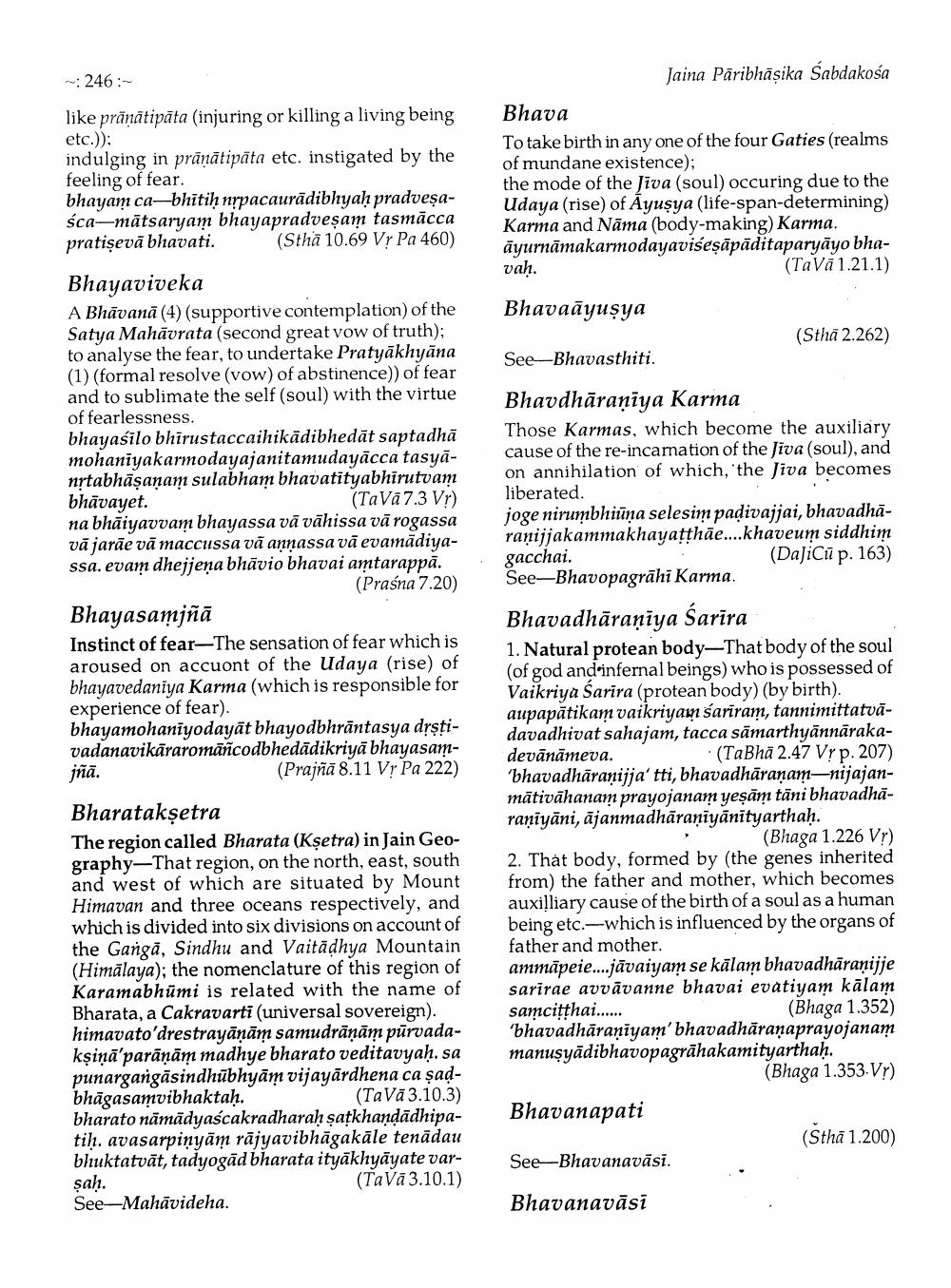________________
: 246 :
Jaina Pāribhāșika Sabdakosa
like prānātipāta (injuring or killing a living being etc.)); indulging in prānātipāta etc. instigated by the feeling of fear. bhayam ca-bhītiḥ nrpacaurādibhyaḥ pradveşaŚca-mātsaryam bhayapradveşam tasmācca pratişevā bhavati. (Sthā 10.69 V? Pa 460)
Bhava To take birth in any one of the four Gaties (realms of mundane existence); the mode of the Jiva (soul) occuring due to the Udaya (rise) of Ayuşya (life-span-determining) Karma and Nāma (body-making) Karma. āyurnāmakarmodayavišeşāpāditaparyāyo bhavah.
(Tavā 1.21.1)
Bhavaāyusya
(Sthā 2.262)
See-Bhavasthiti.
Bhayaviveka A Bhāvanā (4) (supportive contemplation) of the Satya Mahāvrata (second great vow of truth); to analyse the fear, to undertake Pratyākhyāna (1) (formal resolve (vow) of abstinence)) of fear and to sublimate the self (soul) with the virtue of fearlessness. bhayasilo bhirustaccaihikādibhedāt saptadhā mohaniyakarmodayajanitamudayācca tasyanţtabhāṣaṇam sulabham bhavatityabhirutvam bhāvayet.
(TaVā7.3 Vr) na bhāiyavvam bhayassa vā vāhissa vā rogassa vä jarāe vā maccussa vā annassa vā evamädiyassa. evam dhejjeņa bhāvio bhavai amtarappa.
(Praśna 7.20) Bhayasamjñā Instinct of fear-The sensation of fear which is aroused on accuont of the Udaya (rise) of bhayavedaniya Karma (which is responsible for experience of fear). bhayamohanīyodayāt bhayodbhrāntasya drstivadanavikāraromāñcodbhedādikriyā bhayasamjñā.
(Prajmã 8.11Vy Pa 222)
Bhavdhāraniya Karma Those Karmas, which become the auxiliary cause of the re-incarnation of the Jiva (soul), and on annihilation of which, 'the Jiva becomes liberated. joge nirumbhiūņa selesim padivajjai, bhavadhāranijjakammakhayatthāe....khaveum siddhim gacchai.
(DaJiCūp. 163) See-Bhavopagrāhi Karma. Bhavadhāraṇīya Śarīra 1. Natural protean body—That body of the soul (of god and infernal beings) who is possessed of Vaikriya Sarira (protean body) (by birth). aupapātikam vaikriyam śarīram, tannimittatvādavadhivat sahajam, tacca sāmarthyānnārakadevānāmeva.
.(Tabha 2.47 Vyp. 207) 'bhavadhāranijja' tti, bhavadhāranam—nijajanmātivāhanam prayojanam yeşām tāni bhavadharaniyāni, ājanmadhāraṇīyānityarthaḥ.
(Bhaga 1.226 Vr) 2. That body, formed by (the genes inherited from the father and mother, which becomes auxilliary cause of the birth of a soul as a human being etc.--which is influenced by the organs of father and mother. ammāpeie....jāvaiyam se kālam bhavadhāranijje sarirae avvāvanne bhavai evatiyam kālam samcitthai......
(Bhaga 1.352) 'bhavadhāraniyam' bhavadhāraṇaprayojanam manuşyādibhavopagrāhakamityarthaḥ.
(Bhaga 1.353. Vr) Bhavanapati
(Šthā 1.200) See-Bhavanavāsi.
Bharatakşetra The region called Bharata (Kșetra) in Jain Geography-That region, on the north, east, south and west of which are situated by Mount Himavan and three oceans respectively, and which is divided into six divisions on account of the Gargā, Sindhu and Vaitādhya Mountain (Himālaya); the nomenclature of this region of Karamabhūmi is related with the name of Bharata, a Cakravarti (universal sovereign). himavato'drestrayāņām samudrāņām pūrvadakşiņā'parāņām madhye bharato veditavyaḥ. sa punargangăsindhūbhyām vijayārdhena ca şadbhāgasamvibhaktaḥ.
(Tavā 3.10.3) bharato nămădyascakradharah satkhandādhipatih, avasarpinyām rājyavibhāgakāle tenādau bhuktatvāt, tadyogād bharata ityākhyāyate varşaḥ.
(Tavā 3.10.1) See-Mahāvideha.
Bhavanavāsi




